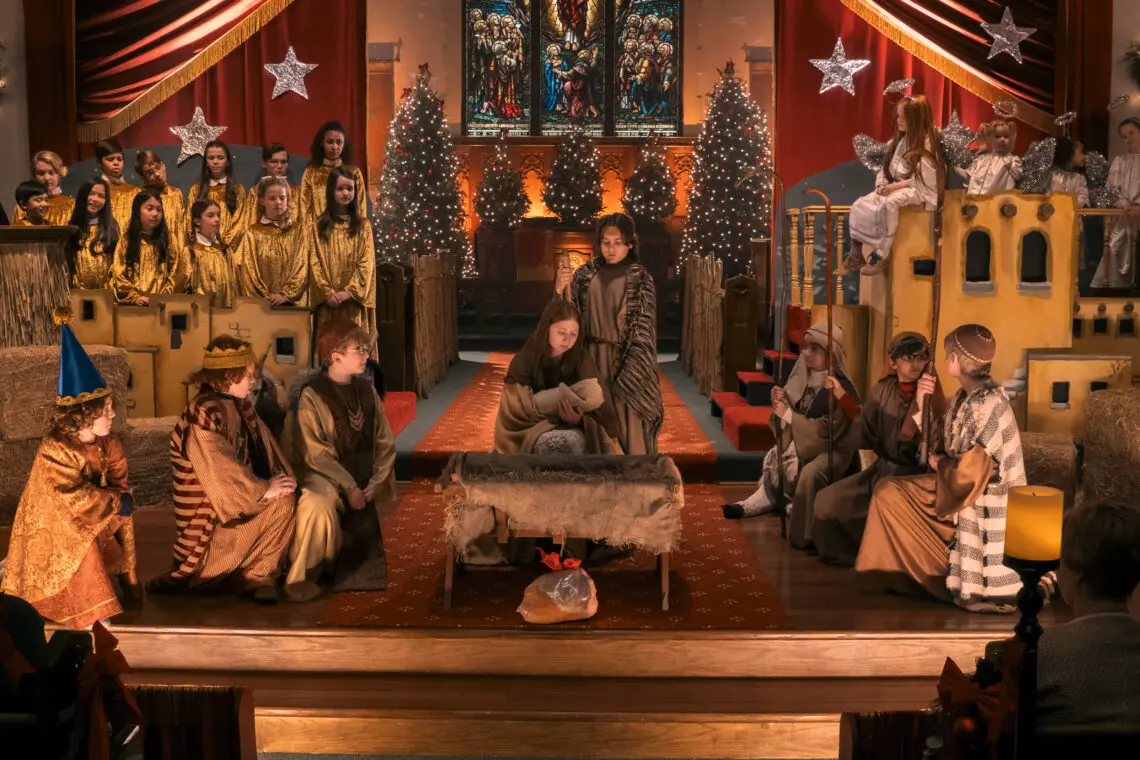Initially a magazine short story, then expanded to novel form in 1972, Barbara Robinson’s “The Best Christmas Pageant Ever” has remained a holiday staple ever since. Its enjoyable central conceit of Roald Dahl-style comedic nastiness — the first sentence pegs principal figures as “absolutely the worst kids in the history of the world” — no doubt explains an enduring popularity among young readers, while there’s just enough inspirational uplift by the end to earn parental approval.
That equation gets reversed to a degree in this first big-screen version from Dallas Jenkins, whose Biblical-times series “The Chosen” set a high mark among faith-based entertainments for the small screen in recent years. His “Pageant” goes a little too sentimental and instructive too soon for those viewers whose attention spans are better suited to the antic earlier going. Nonetheless, this is a well-cast, well-crafted diversion for the whole family that’s already done well for Lionsgate (racking up $10.8 million on more than 3,000 screens) in its initial week of theatrical release, and will surely prove a perennial for Yuletide seasons to come.
The tale is narrated by one Beth Bradley, a grade schooler whose peers in the town of Emmanuel are terrorized by the dreaded Herdmans, a half-dozen brats whose neglectful-at-best parents are never seen or heard from. (Lauren Graham does the voiceover as a reminiscing adult Beth, appearing only in an epilogue sequence, while Molly Belle Wright plays her junior edition.) They bully, they steal, they cuss, they smoke cigars, they light fires. When Beth’s little brother Charlie (Sebastian Billingsley-Rodriguez) is asked his favorite thing about Sunday school, he replies in all honesty that it’s a Herdman-free zone. Alas, his big mouth inadvertently leads those red-haired hellions to believe that church is a place where free snacks and sweets abound.
Popular on Variety Thus they confound all by turning up for services one Sunday, then volunteering for the annual nativity pageant. For reasons of her own, “toughest one of all” Imogene (Beatrice Schneider) decides she will be cast as Virgin Mary — and her siblings in all the other significant roles. This is enraging to many, including the prissier mothers accustomed to having their little darlings showcased. But the Herdmans ensure no other child has the courage to defy them by competing for a part.
Caught in the middle of this coup is Beth’s mom Grace (Judy Greer), who has perhaps foolishly offered to direct the pageant after its usual, iron-fisted minder gets sidelined by an injury. As this is the spectacle’s 75th anniversary, there’s even more attention on it than usual, with Grace pressured to somehow force out the Herdmans before they bring disaster — as everyone expects they will. She refuses, however, noting the spark of genuine if unruly interest from these near-feral kids. Meanwhile, Beth edges toward a sort of detente with her fearsome nemesis Imogene. Needless to say, after chaotic rehearsals, the big event itself on Christmas Eve looks headed off a cliff … before, naturally, it ends up the “best ever.”
Prior incarnations of Robinson’s story, which include a stage play and 1983 TV special (with wee Fairuza Balk a memorable Beth), tended to spring the “bad” kids’ redemption abruptly, making it seem a contrived bow to narrative convention. Jenkins’ three scenarists, however, allow for a more gradual transformation, giving the Herdmans a tad more character depth without excessive hand-wringing. Theirs isn’t so much a religious awakening here as a realization that they needn’t be so adversarial toward a community willing to accept them, after a fashion.
That’s a deft expansion of the original source material. Nonetheless, the film could have trimmed a bit of its newly-created fat, as an eventually tearful pageant climax further slows a progress that loses some cheerful momentum after its midpoint. The preachier tenor may be welcomed by older patrons, but younger ones might’ve appreciated more humor being retained to prevent restlessness during the last half hour or so.
Fortunately, maintaining a certain lighthearted esprit throughout are Greer and Pete Holmes as Beth’s sympathetic, albeit occasionally dithering parents. Other adult roles are adequately filled out in keys variably caricatured or innocuous, while child casting is solid, with Schneider ably shouldering the biggest thespian burden.
The Manitoba-shot feature has an appropriately warm, seasonal, snowy-small-town look in Jean A. Carriere’s production design and C. Kim Miles’ cinematography. Matthew S. Nelson and Dan Haseltine’s effective background score makes room for an array of Christmas carols performed by Blake Shelton and other recording artists.

 Italian
Italian






